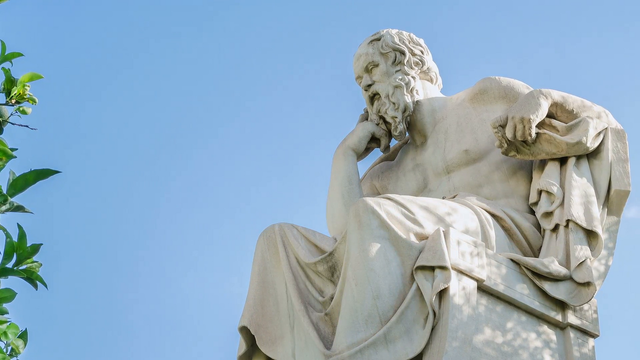2025-2026 Academic Year
The 46th Annual Eunice Belgum Lectures will take place on November 3rd & 4th , 2025.
Belgum Lecturer: Regina Rini
Thinking together in troubling times
Which ideas are worth sharing? Can we disagree without being hateful? And does anyone have the authority to say that a question is settled? These issues press especially hard in times of doubt and disorder. We can learn from earlier thinker’s reflections on their own troubling times.

Lecture 1: Hobbes and the egalitarian tragedy of science
From vaccines to climate change, many people are done listening to experts. They ask: why does some intellectual elite get to tell us what to think? But expertise is unavoidable; modern science is so specialized that no single person can understand it all. This lecture argues that we can best understand the frustrating dilemma of scientific authority by looking back to a time when modern science emerged alongside modern views on political authority. Science, it turns out, is surprisingly like the “Leviathan” of Thomas Hobbes’ political philosophy, a central authority empowered to coordinate individual choices. Coping with modern science denial requires acknowledging people’s reasonable resentment of that authority and offering tools for thoughtfully deciding which authorities to trust.
Monday, November 3rd, 2025
7:00 p.m.-8:30 p.m.
Viking Theater, Buntrock Commons
*light refreshment reception to follow

Lecture 2: Debate: The all-consuming crucible
We shouldn’t always take what others say at face value. When we disagree, we should try to work out the truth. For that we have debate. But the meaning of debate is also debatable, and this lecture arranges just such a clash of minds across time and space, between the 19th century English philosopher John Stuart Mill and the classical Buddhist scholar Nāgārjuna. Mill thought of debate as unconstrained intellectual competition, from which only the truth might emerge unscathed. But Nāgārjuna shows the dangers of this position: the weapons of debate are sharp enough to tear down all ideas, even the true ones. Without good faith – a goal of shared discovery rather than intellectual victory – debate leads only to nihilistic skepticism. Much of the shallowness and divisiveness of modern debate, conducted largely on social media, reflects our failure to find good faith in each other.
Tuesday, November 4th, 2025
4:00 p.m.-5:30 p.m.
Viking Theater, Buntrock Commons
Previous Years’ Speakers
2024 Lewis Gordon, Humanity Matters, The Jazz of Freedom
2023 Simon Critchley, Mysticism: What is Mysticism?, Seven Adverbs God Loveth
2022 Jay Garfield, Māyā and Mokṣa: KC Bhattacharyya’s Vedāntin Response to Kant, Subjectivity and Intersubjectivity: KC Bhattacharyya on the Problem of Other Minds
2021 Costică Brădăţan, Going against the Grain, The Art of Failure. From the Gnostics to Cioran
2020 Meghan Sullivan, Directing Our Inner Lives, Love as a Moral Reason (Held Virtually)
2019 Canceled
2018 Louise Anthony, The Constructive Role of Bias in our Epistemic Lives, The Constructive Role of Bias in our Affective Lives
2017 Charles Mills, Racial Justice, Black Radical Kantianism
2016 Edward Langerak, Meanings of Life, Meanings of Death
2015 John Cooper, Ancient Philosophy as a Way of Life: Socrates, Platonist Philosophy as a Way of Life
2014 Eleonore Stump, The Nature of the Atonement, Atonement and Shame
2013 Daniel Robinson, Consciousness
2012 Lynne Rudder Baker, The Place of Persons in Nature, How Persons Persist in Time
2011 Rachel Cohon, David Hume: Virtuous Action and Character in a Sentiment-Based Moral Philosophy
2010 Thomas Carson, Lincoln’s Ethics: A Philosophical Assessment
2009 Elliott Sober, Philosophical Reflections on Darwin
2008 Barbara Herman, Making Morals Matter
2007 Julia Annas, Virtue and Happiness
2006 Galen Strawson, Episodic Ethics
2005 Jonathan Lear, Ethics and the Collapse of Civilization
2004 Bas van Fraassen, Seeing and Measuring: Connecting Science to Experience
2003 Margaret Urban Walker, Forgiveness and Moral Repair
2002 Frederick Stoutland, How To Believe in Free Will
2001 Lydia Goehr, Listening, Laughing, and Learning
2000 Stephen Darwall, Two Dogmas of Empiricism in Ethics
1999 James Harris, After Relativism
1998 Jean Bethke Elshtain, How Far Have We Fallen?
1997 Hilary Putnam, Mind, Matter, and Making Sense
1996 Gary Iseminger, Aestheticism: Defined and Defended
1995 Georges Rey, Superficialism about Mind and Meaning
1994 Helen Longino, Scientific Knowledge and Feminist Theoretical Virtues
1993 Amelie Rorty, The Many Faces of Morality
1992 Arthur Caplan, Ethics and the Genetic Revolution
1991 Nancy Sherman, Virtue and Ethics
1990 Allan Gibbard, Moral Meanings
1989 Keith Gunderson, The Aesthetic Robot
1988 Laurence Thomas, Living Morally: A Psychology of Moral Character
1987 Rosemarie Tong, Feminist Social Philosophy
1986 Kenneth Sayre, Myths for Our Technological Future
1985 Merold Westphal, The Religious Uses of Modern Atheism
1984 Naomi Scheman, Authority and Paranoia: The Social Construction of Gender and the Philosophical Self
1983 Georg Henrik Von Wright, Truth, Knowledge, and Freedom
1982 Martha Nussbaum, The Fragility of Goodness
1981 Gareth B. Matthews, Conceiving Childhood
1980 Dagfinn Føllesdal, Understanding and Rationality
1979 Kathryn Pyne Parsons, Not Judge, Not Victim, Nor Savior
Related News
Thomas Carson ’72, who was the Belgum Lecture speaker in 2010, has written a book entitled Lincoln’s Ethics, published by Cambridge University Press. He graciously mentions the St. Olaf Philosophy department, and the Belgum Lecture series, in his acknowledgements. Thomas is a Professor of Philosophy at Loyola University, Chicago.
Martha Nussbaum, in the acknowledgements of The Fragility of Goodness, indicates that her 1983 Belgum Lectures of the same title inspired several chapters of the book. She dedicates the relevant chapters to Belgum’s parents, Joe and Esther Belgum. Martha Nussbaum is the Ernst Freund Distinguished Service Professor of Law and Ethics at the University of Chicago.
Memories From A Fellow St. Olaf Student
The vivid impression I retain of Eunice Belgum was generated in a short period time, most of it over fifty years ago. My most salient memories arise from our joint participation in an intensive January term advanced philosophy seminar on The Idea of Freedom directed by Professor Fred Stoutland. Eunice quickly became a respected presence in that seminar, notwithstanding a certain Nordic reticence, perhaps amplified to some degree because she was a sophomore woman (though not the only woman) among primarily senior men. She came to be admired for her sparkling intelligence, for a maturity of judgment beyond her years, for her tenacity in trying to get at what was fundamental, and for being unwilling to be satisfied by what she pointed out were weak or unfinished arguments passing themselves off as “solutions” that would merely end discussion prematurely. This made her a formidable but, in the end, characteristically helpful interlocutor, as I discovered when she drew the straw to be a respondent to my presentation, as the seminar format required. In the end, several sections of my senior thesis were much improved because of her criticism. Regrettably, I talked with her only twice after St. Olaf, in the early 1970s, when she chanced to visit mutual acquaintances in New York and we chatted briefly about each other’s doctoral work. She was writing a Harvard doctoral thesis, a significant contribution to the ongoing discussion of the notoriously complicated concept of akrasia in moral philosophy. Her account apparently proved to be of considerable interest, though transmitted largely by word of mouth, among a number of her scholarly contemporaries. It did not see the light of day as a published work until 1990, over a decade after her death.
The annual Eunice Belgum Memorial lectures have been a particularly fitting tribute to the brilliance and relentless spirit of inquiry of her work as a scholar and teacher, and a meaningful way of partially assuaging the deep sadness that arises from contemplating her untimely death.
—Professor Warren Funk, Class of 1965